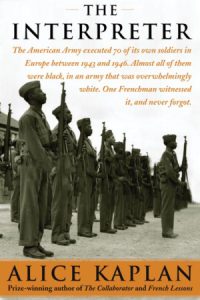Reviews
Review Excerpts
The Washington Post – October 28, 2005
“Kaplan’s is not a book about heroes or gallantry, with the exception of French writer Louis Guilloux, who interpreted on behalf of the Army for French witnesses during some of the trials… Guilloux himself becomes an endearing figure in Kaplan’s book… Kaplan’s book ‘forces us to reckon with racism – and the poor quality of justice soldiers experienced during World War II.’”
— Wil Haygood
The Boston Globe – September 18, 2005
“The knowledge of France during World War II displayed by Alice Kaplan…is impressive. So is her writing… The structure of The Interpreter and, even more, the quality of Kaplan’s composition and writing form a well-sculpted whole, marked by an indignation that is not selective but authentic. The very precision and extent of her research suggest an author whose dedication to her theme amounts to much more than an intent to document her acquaintance and proper use of archival sources. This is an extraordinary book.”
— John Lukacs
Star Tribune (MN) – September 11, 2005
“Alice Kaplan, a distinguished literary historian and translator of French literature at Duke University, continues her exploration of the possibilities for justice in the wake of World War II… With elegance and lucidity, Kaplan revisits [] two trials and reveals an appallingly separate and unequal wartime U.S. military justice system… These two trials vividly illustrate the messiness of justice in times of war and the fundamental inequities that would be addressed only in its aftermath.”
— Martin Schmutterer
Sacramento Bee – September 5, 2005
“Using a French novelist, Louis Guillox, as her muse, author Alice Kaplan has produced a compelling look at the racial disparities as they were played out in the military justice system… She explores both cases in considerable and vivid detail.”
— William Endicott
Los Angeles Times – September 5, 2005
“Though Kaplan doesn’t provide an answer to Guilloux’s question, ‘Why only blacks?’ she gives the question shape and force by bringing the crime and punishment of a black solder into clear focus… The Interpreter reminds us of this sad component of a heroic chapter in American military history.”
— Michael S. Roth
Library Journal – August 2, 2005
“Kaplan has written a brilliant account of the trials of two American soldiers accused of murdering French citizens in the waning days of World War II… French political novelist Louis Guilloux served as an interpreter at these trials, and Kaplan draws from Guilloux’s diaries as well as from a novel he based upon the trials as important sources for this multifaceted work… Inventive, moving, and beautifully written, this is a major contribution to investigative history. Highly recommended.”
Publishers Weekly – July 25, 2005
“In this absorbing study, historian Kaplan digs beneath the statistics to explore how judicial bias operated on a practical level… The result is a nuanced historical account that resonates with today’s controversies over race and capital punishment.”

